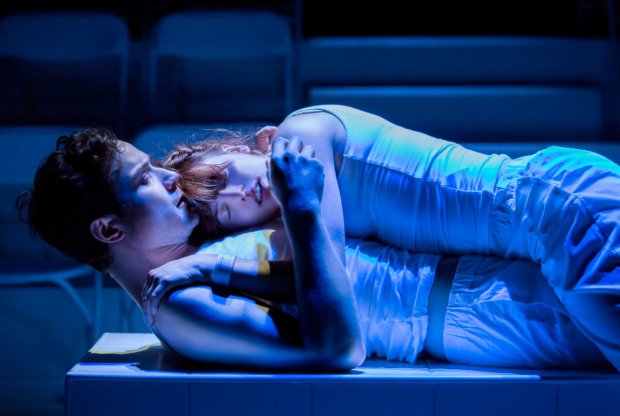The Effect (Sheffield Crucible)
‘This is brain-racing, pulse-quickening, pupil-dilating theatre’

© Johan Persson
Over the course of a pharmaceutical trial for a new antidepressant, two of the volunteers – Tristan and Connie (Henry Pettigrew and Ophelia Lovibond) – fall completely in love. Could it be the dopamine dosage flooding into their systems or is their genuine chemistry upsetting the experiment? Put another way, which comes first: the attraction or the amino acid? What's cause and what's effect?
This is Prebble's path into mind-body dualism. She questions whether our behaviour is the product of chemicals and electrical pulses or whether there's something else: what Gilbert Ryle called 'the ghost in the machine'. That nudges into medical science and, specifically, the way we treat mental health issues: physically or psychologically, with drugs or with counselling? Those overseeing the trial, a female doctor (Priyanga Burford) and a male pharmaceutical executive (Stuart Bunce), disagree – and both speak from personal experience.
'Pettigrew and Lovibond are both flat-out outstanding'
Unlike the tech-heavy premiere, which fixated on the science, Evans's production focuses in on the people. Amanda Stoodley's clinical white-tiled designs lets the actors carry Prebble's argument and, in the process, it blossoms with nuance.
Within seconds, Pettigrew and Lovibond both undermine mental health: she ties herself in knots over sadness/depresson, he makes a 'dementia' face. Neither can help themselves and, as the drug trial kicks in, both play with ideas about self-control – be it over their emotions, their lust or the rules imposed by the doctors. Dropping dictats in the name of science, they seem increasingly authoritarian – almost to the point where anti-depressants start to seem like an excellent way of keeping people, unpredictable as they are, in check. What's science, after all, except our attempt to bring nature under our control?
All this comes from the acting – particularly from Pettigrew and Lovibond, both flat-out outstanding. At first you fall for the pair of them: Pettigrew for his carefree larkiness, Lovibond for her coy intelligence. That seeds the idea – oh so subtly – of behavioural determinism, whereby certain personality traits are inherently and inevitably attractive. It's all in the play: why do men tend towards younger women and vice versa?
Both of them utterly disintegrate: Lovibond's skin seems to burn and she shakes like a leaf; Pettigrew grows manipulative and starts lashing out. It's a fascinating approach to character. What do we know about either of them? One's altered by drugs. The other's a compulsive liar. By they end, of course, they're lashed to one another for life – an unforeseen consequence of events in the lab.
As the supervisors, Burford is parental and protective – though whether of her guinea pigs or her experiment, it's never clear – while Bunce plays Toby with a modulated gloss, as if he's constructed a personality shield so as not to reveal anything about himself. That their relationship echoes that of their patients remains a mite glib and the warp-speed intelligence of the play drops towards the end, but, frankly who cares. This is brain-racing, pulse-quickening, pupil-dilating theatre that puts people front and centre. Unmissable.
The Effect runs at Sheffield Crucible until 18 July













